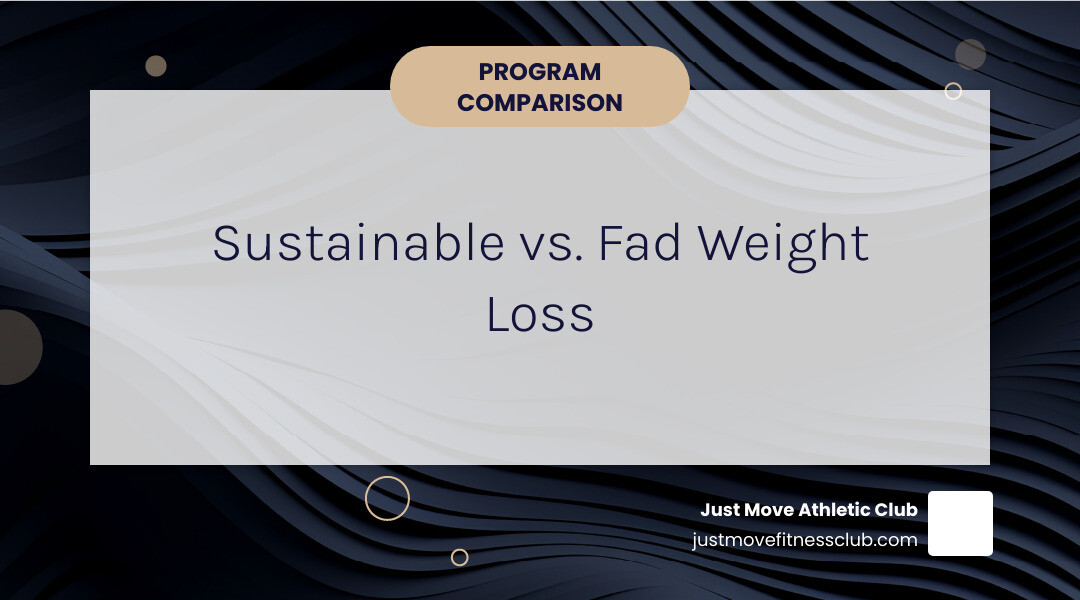Why Choosing the Right Weight Loss Program Can Transform Your Life
Weight loss programs come in many forms, but not all are created equal. Here’s what you need to know about finding the right one:
Effective Weight Loss Programs Include:
- Realistic goals (1-2 pounds per week)
- Balanced nutrition without extreme restrictions
- Regular physical activity plan
- Behavioral support and coaching
- Long-term maintenance strategies
- Medical supervision when needed
Programs to Avoid:
- Promise rapid results (30+ pounds in 30 days)
- Require expensive supplements or special foods
- Eliminate entire food groups
- Make “no diet or exercise” claims
- Lack scientific backing or qualified staff
With nearly 3 in 4 U.S. adults having overweight or obesity, choosing the right weight loss program is crucial. The key difference between success and failure often comes down to sustainability over speed.
Experts recommend an initial weight-loss goal of 5% to 10% of your starting weight within 6 months. Programs focusing on gradual change, habit formation, and lifestyle modification show better long-term results than quick fixes.
Successful approaches combine nutrition, physical activity, and behavioral support, emphasizing lifelong habits over rapid weight loss.
As a fitness professional with over 40 years in the industry, I’ve seen countless people succeed with weight loss programs that prioritize community and sustainable changes. The best programs create lasting change by addressing the whole person, not just the number on the scale.

Understanding Effective Weight Loss: Beyond the Scale
Success in weight loss programs goes beyond the scale; it’s about changing your life and feeling better in your own skin.
Losing even a modest amount of weight brings amazing benefits: more energy, better-fitting clothes, and sounder sleep. Small changes can dramatically reduce your risk for serious health issues like heart disease, diabetes, and high blood pressure.
The CDC highlights numerous benefits of maintaining a healthy weight, showing how losing just 5-10% of your starting weight can make a real difference. Research also shows that weight loss significantly reduces heart disease risk, which is encouraging news for anyone starting their journey.
Real people in effective programs report incredible improvements beyond weight loss. 68% experience a surge in energy levels, while 66% feel more confident in their daily lives. Over half notice better digestion, and nearly half sleep better and experience less joint discomfort. These non-scale victories are what truly matter.
What Separates a Sustainable Program from a Fad Diet?
If a program promises you’ll “lose 30 pounds in 30 days” or claims you can do it “without diet or exercise,” run. These are red flags for fad diets that lead to disappointment and health risks.
Sustainable weight loss programs focus on gradual, steady progress of 1-2 pounds per week. Instead of extreme restrictions, they teach you to eat balanced, nutritious meals you enjoy.
The best programs have strong scientific backing and emphasize building lifelong habits. They don’t require expensive supplements and provide comprehensive behavioral support to help you steer real-life challenges.
Crucially, quality programs include a long-term maintenance plan, recognizing that keeping weight off is the true measure of success.
When to Consult a Doctor Before Starting a Program
Before starting any weight loss program, especially with existing health concerns, talk to your doctor. It’s essential for your safety and success.
Inform your doctor about conditions like diabetes, high blood pressure, or an obesity diagnosis, and any prescription medications you take, as weight loss can affect them.
For instance, with diabetes, your doctor can advise on dietary changes and medication adjustments. For high blood pressure, they’ll help determine safe exercise levels.
Your healthcare provider will help you set realistic, safe goals—typically 5-10% of your starting weight in six months. They might also connect you with specialists like registered dietitians for personalized nutrition guidance.
This professional guidance ensures the program you choose works with your body, not against it, helping you safely become your healthiest self.
The Core Components of High-Quality Weight Loss Programs
An effective weight loss program is a holistic approach that combines several key components to help you make lasting changes. It brings together nutrition, physical activity, and strong support. The best part is personalization—the program fits your unique life, preferences, and health needs.
The National Institute of Diabetes and Digestive and Kidney Diseases (NIDDK) confirms that top programs include a healthy, reduced-calorie eating plan, a custom physical activity plan, guidance for building healthy habits, and a plan for keeping the weight off. When these components work together, you get results.
The Role of Nutrition and Mindful Eating
In a successful weight loss program, what you eat is crucial. It’s not just about eating less, but eating smarter by focusing on calorie quality. We recommend nutrient-dense foods packed with vitamins and minerals to keep you full and satisfied, such as lean meats, fish, fruits, veggies, beans, whole grains, and healthy fats from avocados, nuts, and olive oil.

Portion control is also key, as it’s easy to overeat even healthy foods. Meal planning is a game-changer. Studies show planning meals is linked to better weight status because it helps you make healthier choices and avoid impulsive eating.
Mindful eating techniques help you pay attention to your body’s hunger and fullness signals and understand emotional eating triggers. Simple changes like proper hydration by swapping sugary drinks for water make a huge difference. Also, remember the power of fiber for weight loss, which helps you feel full longer.
Integrating Physical Activity for Lasting Results
While nutrition is a huge piece of the puzzle, physical activity is essential for long-term weight loss and well-being. It builds strength, boosts your metabolism, and helps you find joy in being active. A good weight loss program blends both aerobic exercise and strength training.
Aerobic activities like walking, jogging, or cycling burn calories and are great for your heart. But don’t forget strength training. Building muscle is crucial because “your muscle is your metabolism!” More muscle means more calories burned at rest, which is a secret weapon for long-term weight management.
The NIDDK suggests 150 to 300 minutes of physical activity weekly for weight maintenance, which can be broken into smaller chunks. The key is consistency over intensity, especially when starting. The best exercise is one you enjoy and will do consistently, whether it’s a fitness class, a walk, or lifting weights.
Behavioral Support: The Key to Changing Habits
Weight loss isn’t just about diet and exercise; it’s connected to your habits, mindset, and emotions. Strong behavioral support is the secret ingredient in a weight loss program that turns temporary changes into lifelong habits.
Top programs provide guidance for building healthy habits, including setting achievable goals. Accountability through a coach, group, or app is powerful. Knowing you have support helps you stay on track, and studies show health coach support is highly effective.
Behavioral support teaches you to manage your triggers, like emotional eating, stress, social events, and poor sleep. It’s about building strategies to handle life’s challenges without derailing your progress. This support leads to non-scale victories like more energy and confidence.
Understanding Medically-Supervised Options
For those with significant obesity or related health issues, a medically-supervised weight loss program may be the best path. These programs combine expert medical care with lifestyle changes and may include weight-loss medications.
You might have heard about medications like GLP-1 agonists (semaglutide, tirzepatide), which have gained attention for their effectiveness. They mimic hormones that control appetite and blood sugar, helping you feel fuller with fewer cravings. You can find detailed information on GLP-1s from reliable medical sources.
These medications aren’t a magic fix. They are tools that must be used under a doctor’s supervision, who will determine if they’re safe for you. The best results occur when medication is combined with comprehensive lifestyle changes like diet, exercise, and behavioral support. This complete package helps you lose weight, keep it off, and improve your overall health.
How to Evaluate and Choose the Right Program for You
Choosing the right weight loss program is a big step. It’s not about flashy ads or fast results, but finding a solution that fits your life, preferences, and long-term health goals. Think of it as finding a trusted partner for your health journey.

Approach this decision carefully, vetting each program before committing. Consider how it fits your routine, food preferences, and budget. The best program is one you can stick with long-term.
Financial Considerations and Typical Costs
The cost of weight loss programs varies widely. It’s important to understand the full financial picture before signing up.
You might see typical costs like:
- Membership fees: These can be monthly, perhaps as low as $23, or weekly, with some structured programs starting at less than $66 per week.
- A la carte services: Some programs might charge extra for one-on-one coaching, special classes, or access to certain features.
- Cost of special foods or meal replacements: If a program provides pre-portioned meals, the cost of food is included. This adds convenience and helps with portion control.
- Hidden fees: Ask about extra costs for supplements, tests, counseling, or ongoing maintenance support.
- Insurance coverage: Some medically-supervised or doctor-prescribed programs may be partially covered by insurance, though it’s uncommon for general wellness programs.
Always ask for a detailed cost breakdown. A free consultation is a great way to get this information without pressure. Investing in a quality program is an investment in your future well-being.
How to spot and avoid ineffective weight loss programs and scams
The weight loss industry has programs that don’t work, are harmful, or are scams. Knowing what to look for can save you time, money, and frustration.
Be wary of programs with promises that sound “too good to be true.” Watch out for claims like:
- “Lose 30 pounds in 30 days” – A healthy, sustainable rate is 1 to 2 pounds per week.
- “Lose weight without diet or exercise” – This isn’t how our bodies work.
- “Lose weight while eating as much as you want” or claims about “spot reduction.”
- Programs that push “secret” ingredients, “miracle” pills, or unproven supplements.
- Before-and-after photos that look “too perfect,” with tiny disclaimers.
- High-pressure sales tactics that rush you into signing up.
These tricks prey on the desire for quick fixes. Look for programs backed by science with qualified staff. If you suspect a scam, report it to the Federal Trade Commission. Your awareness helps protect others.
Key questions to ask before you commit to any weight loss programs
Before investing time and money, arm yourself with smart questions. A reputable weight loss program will answer them honestly. Here’s a checklist:
- Do studies show your program works? Ask for evidence, like published research, proving it’s safe and effective.
- How does your program work? Understand the process: Is it in-person, online, or app-based? How long does it last? Can it be customized for your lifestyle?
- What is the total cost? Get an estimate including any hidden fees for membership, food, supplements, counseling, or maintenance support.
- What does your program include? Does it offer a meal plan or require special foods? Is there an adjustable physical activity plan?
- What are the staff’s qualifications? Is the program overseen by a doctor or certified health professional? Are there registered dietitians or exercise physiologists on staff?
- What are the typical results? Ask about average weight loss and how long people maintain it. Be wary of programs that only show extreme success stories.
- What are the risks? Understand potential health concerns. How is safety ensured, and will they work with your healthcare provider?
- What support is available for long-term maintenance? This is crucial, as maintenance can be more challenging than the initial loss.
Asking these questions gives you a clear picture of the program’s structure, effectiveness, and commitment to your long-term success.
Life After the Program: Maintaining Your Success
Achieving your weight loss goals is an incredible accomplishment. But your health journey doesn’t end there. The ultimate success is maintaining your new, healthier weight and making those changes a permanent part of your life. It’s about transitioning from a structured weight loss program to a new, empowering normal.
This phase is about weaving the lessons you’ve learned into a sustainable, enjoyable lifestyle. The goal is to feel empowered, not restricted, as you thrive.
Strategies for Long-Term Weight Maintenance
Maintaining weight loss requires ongoing effort but doesn’t have to be an uphill battle. The best strategies mirror the core principles of weight loss, with a focus on making them sustainable and enjoyable.
Continued physical activity is key. The NIDDK recommends 150 to 300+ minutes of activity weekly for weight maintenance. This movement burns calories, boosts metabolism, and maintains muscle. The key is to find activities you love and make them part of your routine.
Continue practicing mindful eating habits. Tune into your body’s hunger and fullness cues, savor your meals, and stop when you’re satisfied. This helps prevent overeating and ensures you’re nourishing your body properly.
Regular self-monitoring is another powerful tool. Without being obsessive, maintain awareness by tracking your weight, eating, and activity levels. This gives you an early warning if you start to drift off track.
Your body’s energy needs change as you lose weight, so you may need to adjust your calorie intake to maintain your new body weight. It’s about listening to your body to find the right balance.
Finally, set new health goals after reaching your target weight, like improving fitness or building strength. This keeps you motivated. Studies like the Look AHEAD study show that sustained lifestyle changes lead to long-term weight maintenance. You can explore more research on weight loss maintenance.
Building a Lifelong Healthy Relationship with Food and Exercise
The ultimate goal is a lifelong, healthy relationship with food and exercise. This means abandoning “all-or-nothing” thinking and embracing flexibility.
Celebrate your non-scale victories! Gems like a surge in energy, fitting into old clothes, or an improved mood reinforce the positive impact of your new habits.
Find joy in movement. Exercise shouldn’t feel like a punishment. Explore activities like dancing, hiking, swimming, or weight training to find what you love. The best exercise is one you look forward to.
Cooking at home gives you control over ingredients and portions, making healthy eating delicious and satisfying.
Building a supportive social circle is valuable. Surround yourself with people who uplift your healthy choices. “Consistency over perfection” is your mantra. If you veer off course, gently get back on track without guilt. This compassionate approach builds resilience and ensures your healthy habits last a lifetime.
Conclusion
Finding the right weight loss program is about more than losing pounds; it’s about changing your relationship with health. An effective program includes realistic goals, balanced nutrition, consistent physical activity, and behavioral support to steer life’s challenges.
The best programs focus on gradual, sustainable change, not overnight miracles. They are science-backed, professionally staffed, and transparent about costs. Crucially, they prepare you for long-term maintenance.
If you have health conditions like diabetes or high blood pressure, consult your doctor. They are your best ally for choosing a safe, effective approach for your unique health profile.
The magic happens during maintenance—when healthy eating is second nature, you enjoy moving your body, and you celebrate non-scale victories. Building lifelong healthy habits means embracing consistency over perfection and finding joy in the process.
A quality program or fitness club will understand that every person’s fitness journey is unique. That’s why they focus on creating personalized experiences that combine effective workouts with progress tracking. They’re not just about helping you reach your goals – they’re about building sustainable, healthy habits that last a lifetime.
Your health is an investment, not an expense. It’s never too late to start, and every small step forward is worth celebrating. Take the first step on your fitness journey today.


